The Value of Volunteering
With a friendly army of volunteers being crucial to the success of the FIFA World Cup Qatar 2022™, QF made sure they had the specialist skills needed to keep supporters with accessibility needs safe, and smiling.
Through a QF partnership with FIFA, announced in July, accessibility volunteers were recruited and trained to support the delivery of the tournament, equipping them with the skills and awareness necessary to create a welcoming environment for differently abled football fans.
These volunteers would be part of the visitor experience on offer throughout the FIFA Fan Festival at Al Bidda Park, within sensory havens on the Corniche, and along the route to the Education City Stadium, with Ryan Moignard, Special Needs Football Coach at QF, saying: “Volunteers are key to the success of all mega-events, and much more so at events that have people with accessibility needs in attendance.
“I would go as far as saying volunteering to support people with accessibility needs is one of the most impactful forms of volunteering anyone can do.”
With a friendly army of volunteers being crucial to the success of the FIFA World Cup Qatar 2022™, QF made sure they had the specialist skills needed to keep supporters with accessibility needs safe, and smiling.
Through a QF partnership with FIFA, announced in July, accessibility volunteers were recruited and trained to support the delivery of the tournament, equipping them with the skills and awareness necessary to create a welcoming environment for differently abled football fans.
These volunteers would be part of the visitor experience on offer throughout the FIFA Fan Festival at Al Bidda Park, within sensory havens on the Corniche, and along the route to the Education City Stadium, with Ryan Moignard, Special Needs Football Coach at QF, saying: “Volunteers are key to the success of all mega-events, and much more so at events that have people with accessibility needs in attendance.
“I would go as far as saying volunteering to support people with accessibility needs is one of the most impactful forms of volunteering anyone can do.”
As QF continued its efforts to help make the FIFA World Cup Qatar 2022™ a truly accessible tournament, football was playing a central role in inspiring young learners at Education City.
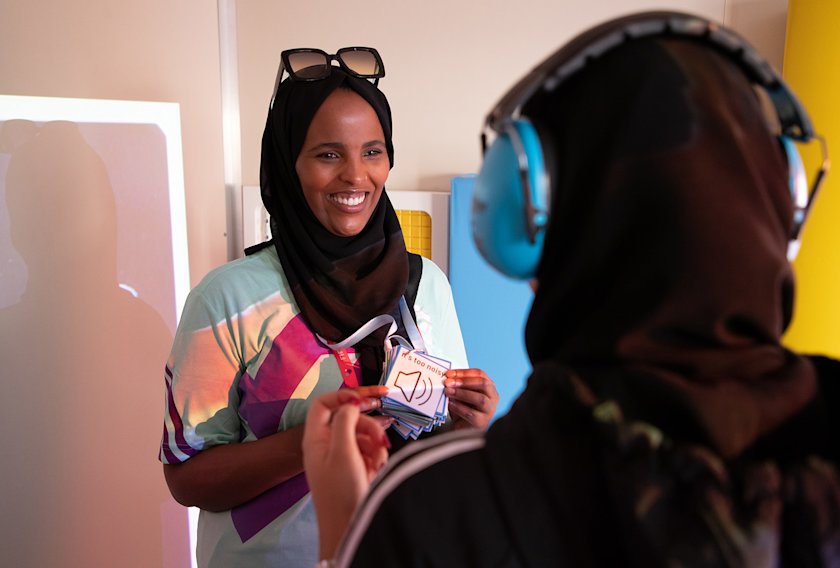
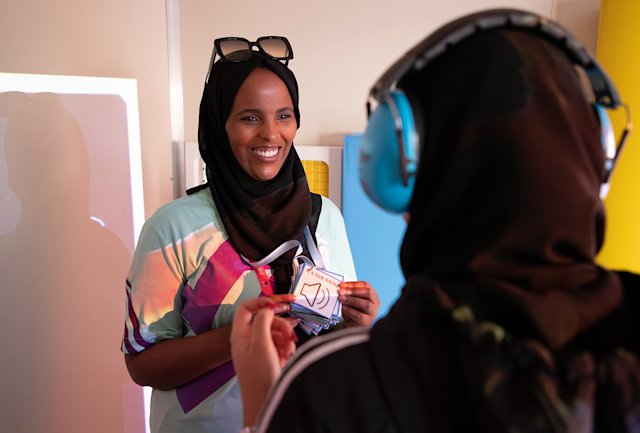
Our presence as volunteers can make or break the experience for someone with accessibility needs, and that’s what inspires me to keep doing it.
247 accessibility volunteers were trained by QF experts, along with 10 Education City heritage volunteers and around 240 QF educational volunteers
A Different Class
Football fever was on the curriculum in QF schools throughout 2022 – as teachers used the FIFA World Cup Qatar 2022™ to bring a new dimension to learning.
At Renad Academy – a QF school that helps children with autism – accessibility toolkits developed by the school and QF’s The Learning Center as part of the SC’s online, interactive education platform Tamreen helped children learn about the World Cup, its impact on Qatar, and how football connects to Qatari culture and heritage, while students designed a commemorative sustainable football bench and created their own songs, tickets, and ‘matchday experience’ for friendly football games.
Meanwhile, young learners at QF’s Qatar Leadership Academy (QLA) explored sport through a of global citizenship lens, looking at how the cultures of FIFA World Cup Qatar 2022™ nations resemble and differ from their own.
“At the heart of the World Cup and sports education are lessons of tolerance, global mindedness, and respecting other cultures, which we are trying to impart to our students by using football as a tool for learning,” said QLA Lead Teacher Khalaf S. Al-Merekhi.
Football fever was on the curriculum in QF schools throughout 2022 – as teachers used the FIFA World Cup Qatar 2022™ to bring a new dimension to learning.
At Renad Academy – a QF school that helps children with autism – accessibility toolkits developed by the school and QF’s The Learning Center as part of the SC’s online, interactive education platform Tamreen helped children learn about the World Cup, its impact on Qatar, and how football connects to Qatari culture and heritage, while students designed a commemorative sustainable football bench and created their own songs, tickets, and ‘matchday experience’ for friendly football games.
Meanwhile, young learners at QF’s Qatar Leadership Academy (QLA) explored sport through a of global citizenship lens, looking at how the cultures of FIFA World Cup Qatar 2022™ nations resemble and differ from their own.
“At the heart of the World Cup and sports education are lessons of tolerance, global mindedness, and respecting other cultures, which we are trying to impart to our students by using football as a tool for learning,” said QLA Lead Teacher Khalaf S. Al-Merekhi.
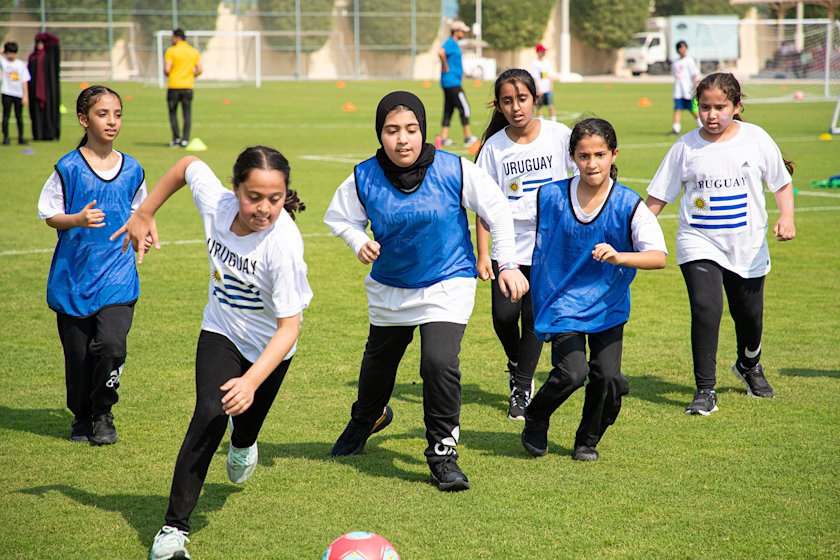
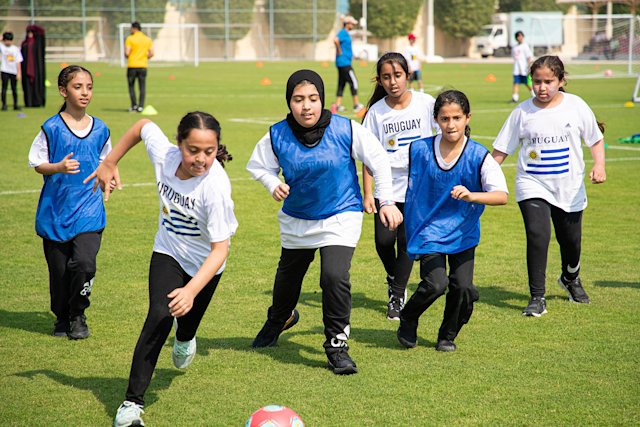
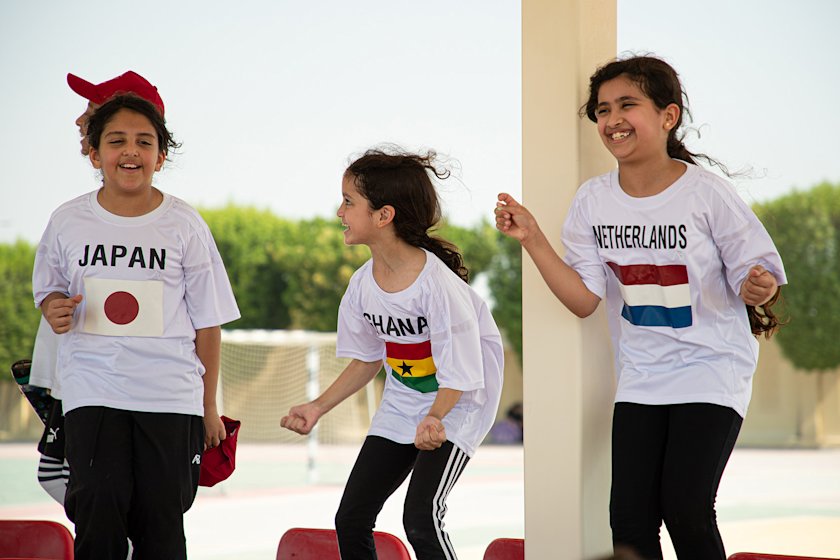
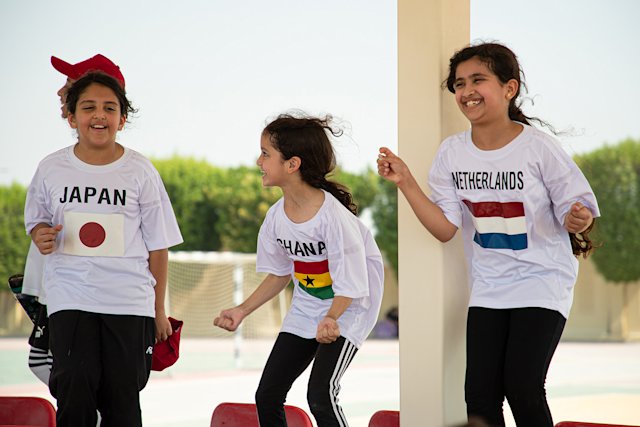
Students benefit enormously when we’ve incorporated football into learning at QF schools – living in the host country of the FIFA World Cup Qatar 2022 is one of the most defining moments in their young lives.
Learning Through Football
From geography and art to writing and math, football played its part in the learning experience for students at QF’s Qatar Academy Sidra – who were set tasks such as calculating the distance between FIFA World Cup Qatar 2022™ stadiums and how many spectators they hold, analyzing the design of tournament posters, and making their own trophy using recycled materials.
The ‘Units of Inquiry’ learning stream at Qatar Academy Al Wakra challenged students to understand football’s impact and value on their lives, while Qatar Academy Al Khor taught its Grade 6-10 students about football history and what the FIFA World Cup Qatar 2022™ has already meant, and will mean, for Qatar.
And Qatar Academy Msheireb, also part of QF’s Pre-University Education, organized Football Fever, a series of events supporting learning outcomes in physical education, performing and visual arts, language, and innovation, as well as its own World Cup-style football tournament; while around 80 Qatar Academy Doha students performed ‘Goal’, a musical production focusing on the debate on whether the sport should be called “football” or “soccer”.
From geography and art to writing and math, football played its part in the learning experience for students at QF’s Qatar Academy Sidra – who were set tasks such as calculating the distance between FIFA World Cup Qatar 2022™ stadiums and how many spectators they hold, analyzing the design of tournament posters, and making their own trophy using recycled materials.
The ‘Units of Inquiry’ learning stream at Qatar Academy Al Wakra challenged students to understand football’s impact and value on their lives, while Qatar Academy Al Khor taught its Grade 6-10 students about football history and what the FIFA World Cup Qatar 2022™ has already meant, and will mean, for Qatar.
And Qatar Academy Msheireb, also part of QF’s Pre-University Education, organized Football Fever, a series of events supporting learning outcomes in physical education, performing and visual arts, language, and innovation, as well as its own World Cup-style football tournament; while around 80 Qatar Academy Doha students performed ‘Goal’, a musical production focusing on the debate on whether the sport should be called “football” or “soccer”.
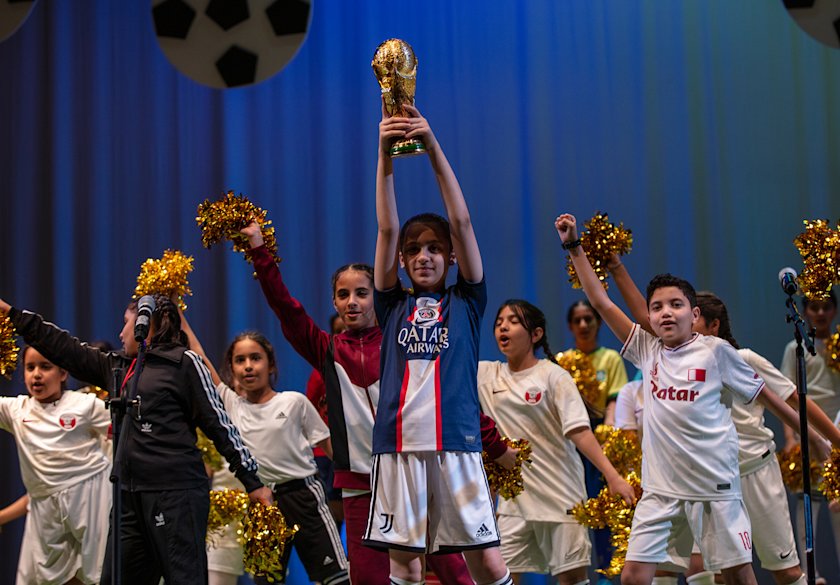
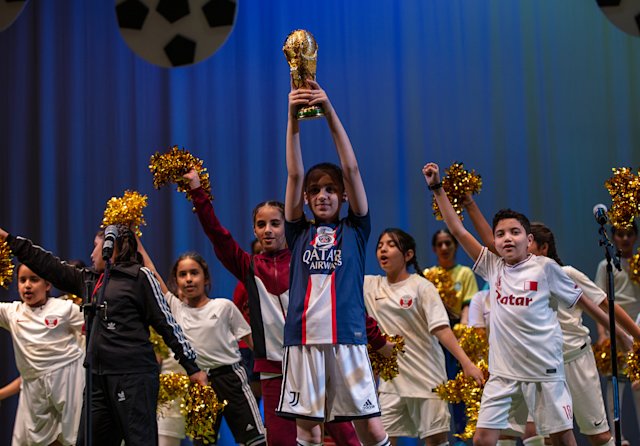
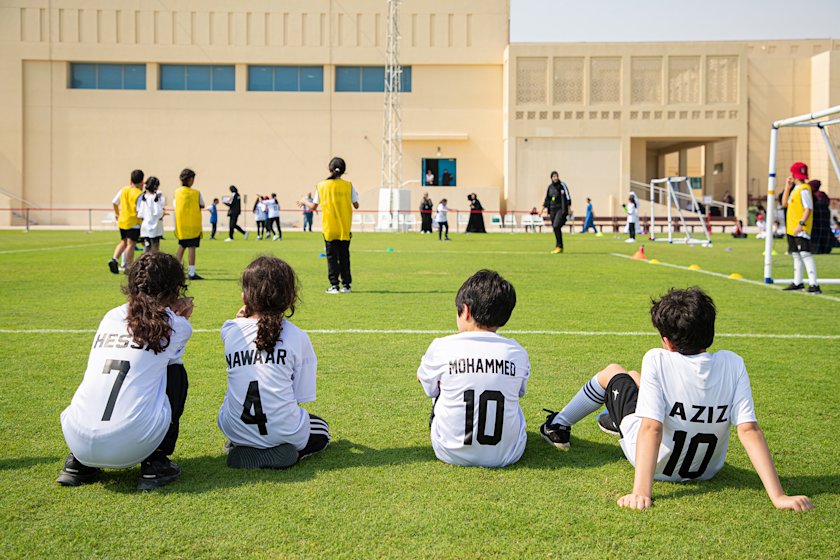
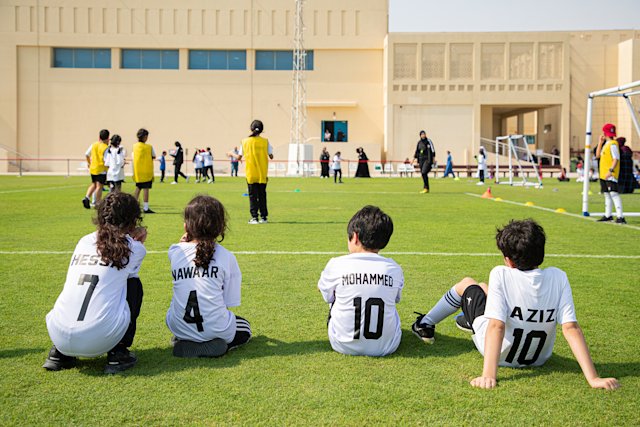
It just makes school that much more fun and something, like the World Cup, we all look forward to.
The Impact of Football
Football’s relationship with the media, its fan culture, its socio-political influence, and its meaning beyond the glory of goals and the cheers from the stands were placed in the spotlight through the latest exhibition at QF’s partner university Northwestern University in Qatar’s Media Majlis.
Is It A Beautiful Game? – unveiled in July and held in the run-up to the FIFA World Cup Qatar 2022™ – used eight interactive installations to allow visitors to examine the game and its impact on lives and societies from the perspective of the fan, the player, and the media. It is the first major exhibition to explore the relationship between the media and football.
Meanwhile, a Northwestern Qatar student and a fellow QF student from Georgetown University in Qatar achieved a rare research feat for undergraduates – having their work published in a leading peer-reviewed international journal.
Sahar Bou Hamdan and Bouthaina El-Kheshn co-authored a study into how music is used by marginalized communities to make their voice heard, focusing on the music of Lebanon and Egypt, with their findings being showcased in the Central European Journal of Communication.
Football’s relationship with the media, its fan culture, its socio-political influence, and its meaning beyond the glory of goals and the cheers from the stands were placed in the spotlight through the latest exhibition at QF’s partner university Northwestern University in Qatar’s Media Majlis.
Is It A Beautiful Game? – unveiled in July and held in the run-up to the FIFA World Cup Qatar 2022™ – used eight interactive installations to allow visitors to examine the game and its impact on lives and societies from the perspective of the fan, the player, and the media. It is the first major exhibition to explore the relationship between the media and football.
Meanwhile, a Northwestern Qatar student and a fellow QF student from Georgetown University in Qatar achieved a rare research feat for undergraduates – having their work published in a leading peer-reviewed international journal.
Sahar Bou Hamdan and Bouthaina El-Kheshn co-authored a study into how music is used by marginalized communities to make their voice heard, focusing on the music of Lebanon and Egypt, with their findings being showcased in the Central European Journal of Communication.
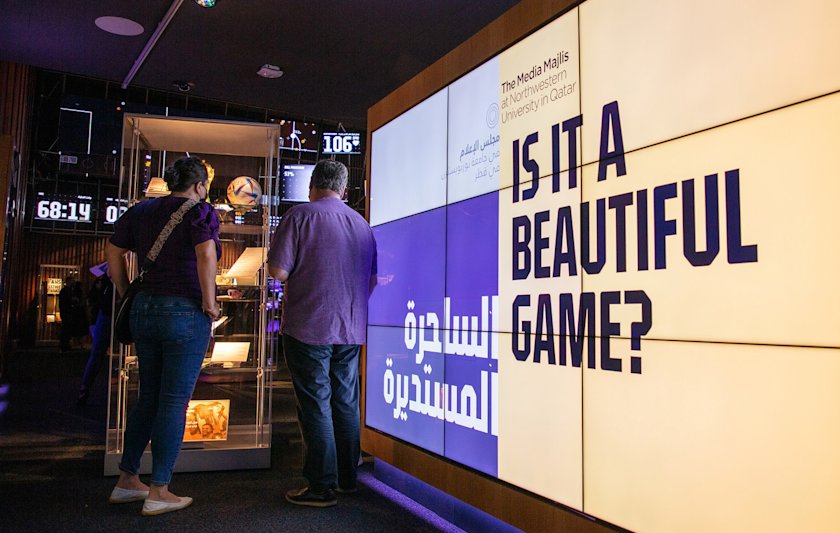
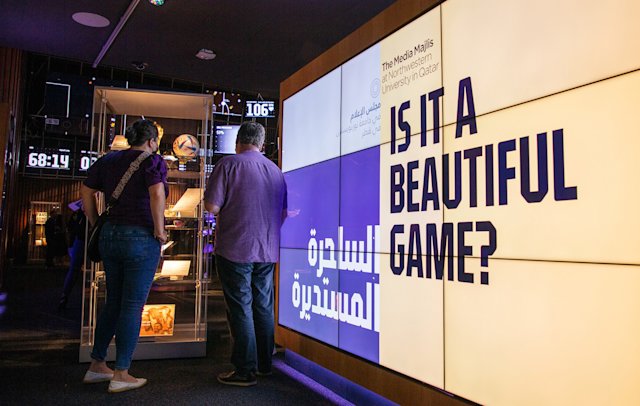
Football and the media are two multi-billion-dollar industries with a complex relationship that continues to grow, shape, and morph across time, technology, and cultures.
More than 280 pieces of physical and digital content were brought together for the Is It A Beautiful Game? Exhibition
Teaming Up to Innovate
To give students an opportunity – and a challenge – to develop innovative solutions to complex issues, faculty from universities at QF joined forces to launch the Product X Bootcamp.
The Education City-wide initiative put students together in multidisciplinary teams, mentored by faculty, to form creative, entrepreneurial, and sustainable ideas on how wasteful food containers can be repurposed to become part of a circular economy. At the end of the camp, they presented their innovative ideas to stakeholders from industry and the community.
Product X was designed to offer a collaborative, experiential learning experience, reflecting how institutions within QF’s unique educational environment at Education City are intertwined, and participant Fatima Al-Mannai, a Virginia Commonwealth University School of the Arts student, said: “Product X allowed me to collaborate with students from all disciplines to build a single product.
“This has broadened my understanding of how each of our majors is useful in the process of generating a circular-cycle product.”
To give students an opportunity – and a challenge – to develop innovative solutions to complex issues, faculty from universities at QF joined forces to launch the Product X Bootcamp.
The Education City-wide initiative put students together in multidisciplinary teams, mentored by faculty, to form creative, entrepreneurial, and sustainable ideas on how wasteful food containers can be repurposed to become part of a circular economy. At the end of the camp, they presented their innovative ideas to stakeholders from industry and the community.
Product X was designed to offer a collaborative, experiential learning experience, reflecting how institutions within QF’s unique educational environment at Education City are intertwined, and participant Fatima Al-Mannai, a Virginia Commonwealth University School of the Arts student, said: “Product X allowed me to collaborate with students from all disciplines to build a single product.
“This has broadened my understanding of how each of our majors is useful in the process of generating a circular-cycle product.”
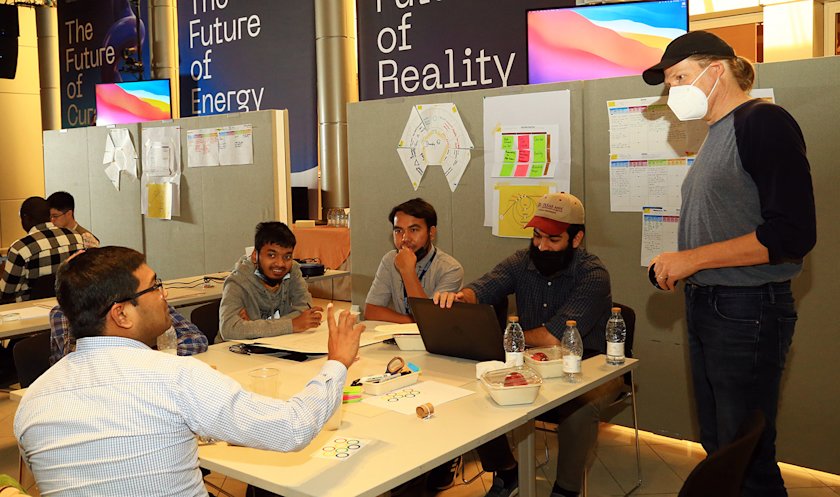
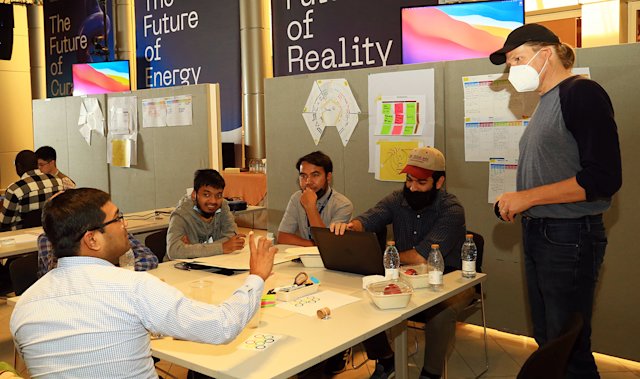
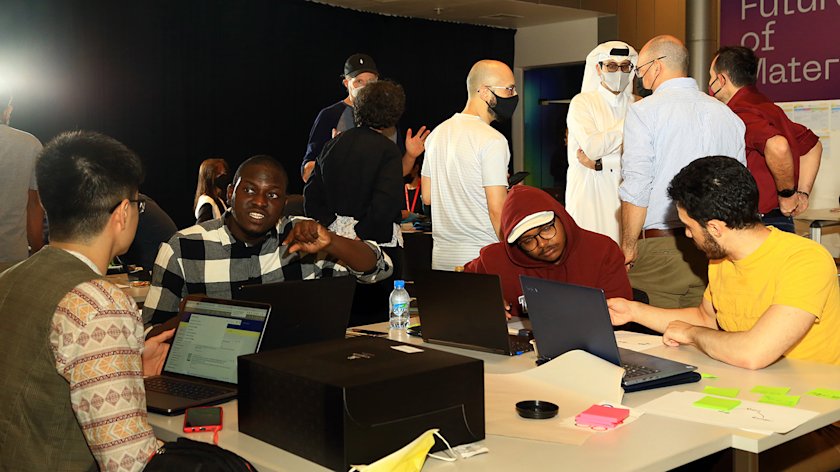
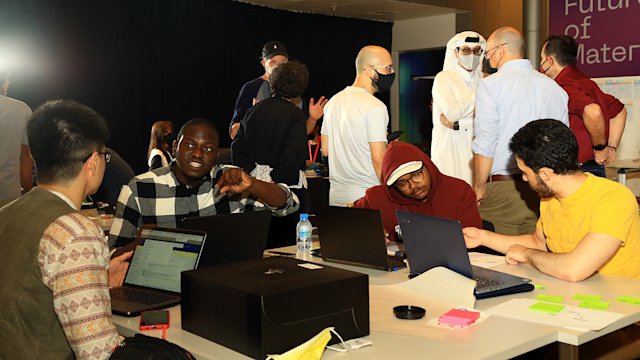
The bootcamp really showed me how students from a variety of majors can contribute to a sustainable future for the planet.
Ready for Business
With the aim of enhancing the learning experience it offers for Qatar’s business community, and providing educational tools that have value both within and beyond Qatar, a QF partner university launched the nation’s first business research laboratory.
Established by HEC Paris in Qatar, the laboratory will develop locally and regionally focused teaching materials for its Executive MBA course, as well as developing business simulations and case studies, conducting industry-specific research, and collaborating with entities and companies to produce business insights from Qatar and its neighboring countries, for educational use worldwide.
“Developing learning material from the region, and for the region, helps ensure the relevance of our teaching for learners based here,” said Joshua Kobb, Executive Director for Partnerships and Growth at HEC Paris in Qatar.
“At the same time, we are able to advance our teaching mission to help the global business community understand the context and dynamics of Qatar and the region.”
With the aim of enhancing the learning experience it offers for Qatar’s business community, and providing educational tools that have value both within and beyond Qatar, a QF partner university launched the nation’s first business research laboratory.
Established by HEC Paris in Qatar, the laboratory will develop locally and regionally focused teaching materials for its Executive MBA course, as well as developing business simulations and case studies, conducting industry-specific research, and collaborating with entities and companies to produce business insights from Qatar and its neighboring countries, for educational use worldwide.
“Developing learning material from the region, and for the region, helps ensure the relevance of our teaching for learners based here,” said Joshua Kobb, Executive Director for Partnerships and Growth at HEC Paris in Qatar.
“At the same time, we are able to advance our teaching mission to help the global business community understand the context and dynamics of Qatar and the region.”
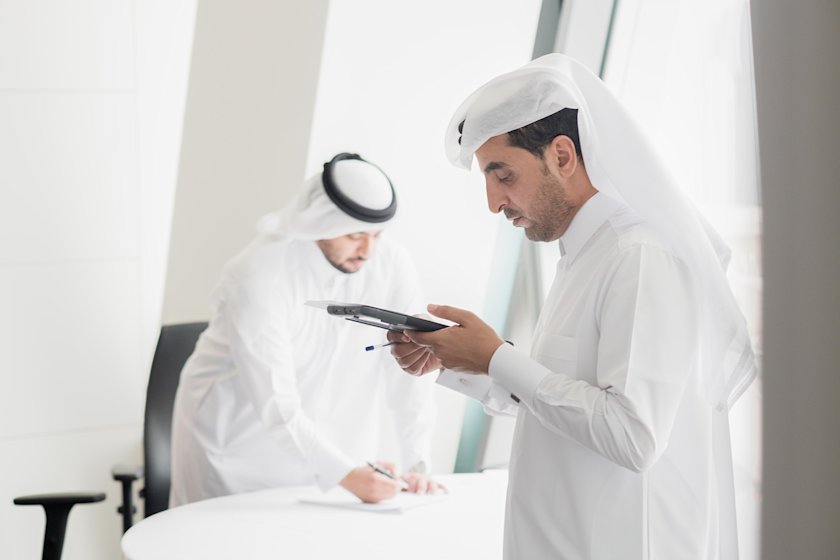
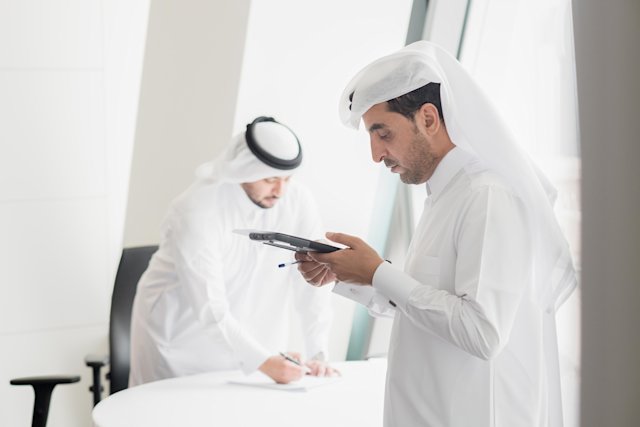
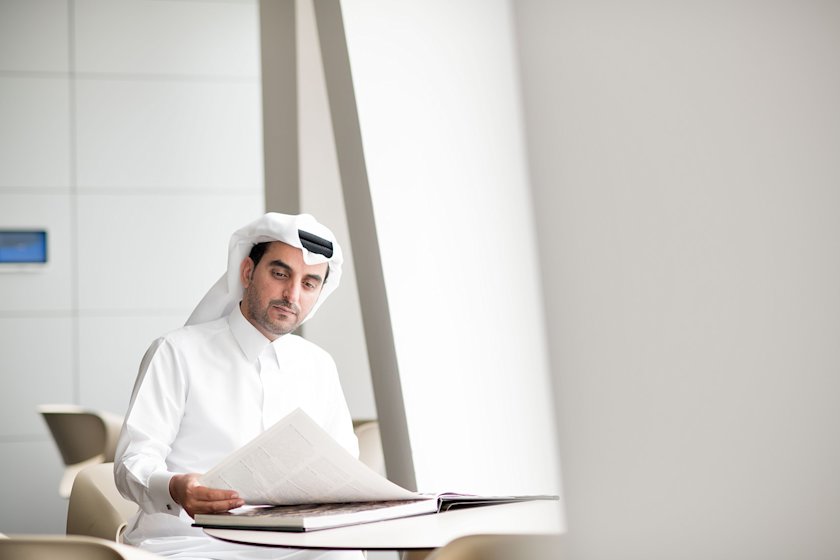
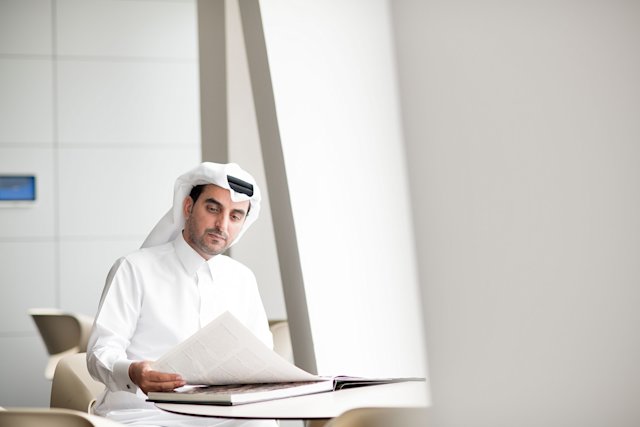
The Business Research Laboratory at HEC Paris in Qatar aims to create world-class teaching material for its offering in Qatar and the rest of the world, including Europe and the US.
Focusing on the Family
Ways of supporting families during crises, and emphasizing the importance of the family unit in troubled times, were spotlighted by QF’s Doha International Family Institute (DIFI) in July on the sidelines of the United Nations Human Rights Council’s 50th session.
Speaking at the Geneva session, Dr. Sharifa Noaman Al Emadi, DIFI’s Executive Director, explained how a study by the institute on the impact of the COVID-19 pandemic on families had shown that the crisis had actually helped them become more cohesive, reinforcing the need for togetherness amid challenges.
“We need to communicate our local experiences, which have proven the necessity of rallying around the family as opposed to division in emergencies and crises, to global platforms,” she said.
Meanwhile, researchers from QF member Hamad Bin Khalifa University’s (HBKU) College of Islamic Studies presented the results of a year-long study into Muslim youth’s interactions with social media, and its effects on them, at the 12th International Conference on Religion and Spirituality in Spain. Among the areas studied was how young Muslims use social media for religious reasons.
Ways of supporting families during crises, and emphasizing the importance of the family unit in troubled times, were spotlighted by QF’s Doha International Family Institute (DIFI) in July on the sidelines of the United Nations Human Rights Council’s 50th session.
Speaking at the Geneva session, Dr. Sharifa Noaman Al Emadi, DIFI’s Executive Director, explained how a study by the institute on the impact of the COVID-19 pandemic on families had shown that the crisis had actually helped them become more cohesive, reinforcing the need for togetherness amid challenges.
“We need to communicate our local experiences, which have proven the necessity of rallying around the family as opposed to division in emergencies and crises, to global platforms,” she said.
Meanwhile, researchers from QF member Hamad Bin Khalifa University’s (HBKU) College of Islamic Studies presented the results of a year-long study into Muslim youth’s interactions with social media, and its effects on them, at the 12th International Conference on Religion and Spirituality in Spain. Among the areas studied was how young Muslims use social media for religious reasons.
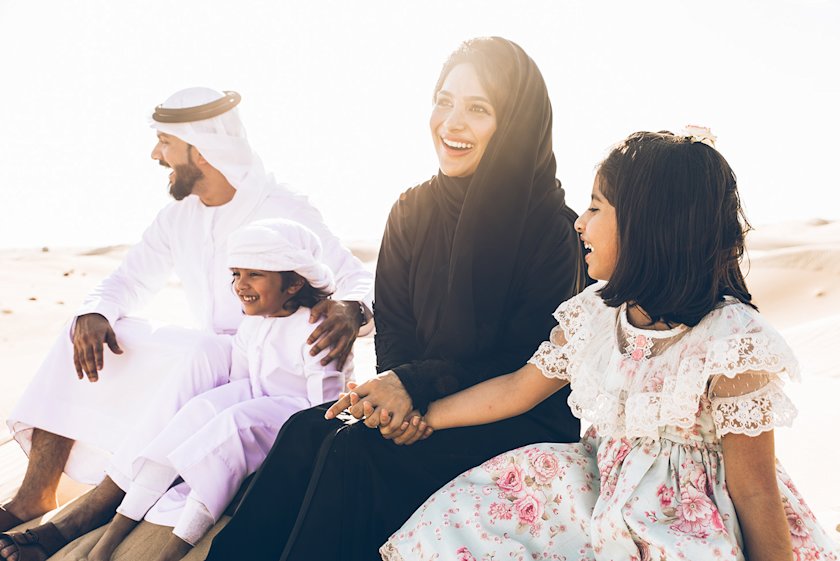
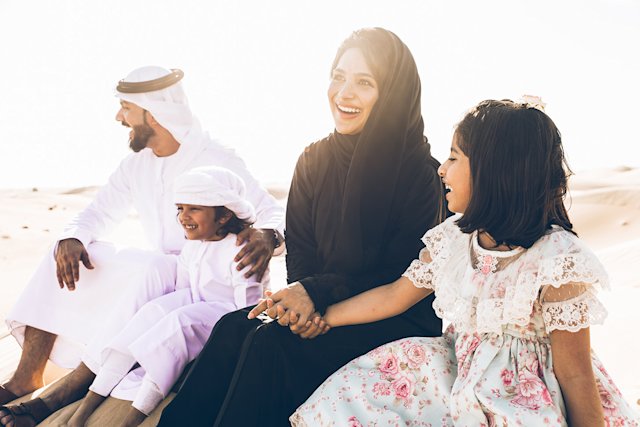
We look forward to expanding the study and developing much-needed scholarship on the interactions between social media and Muslim youth in the region.
Solar Horizons
A new tracker system designed to provide real-world data about hot desert climates, developed by HBKU’s Qatar Environment and Energy Research Institute (QEERI), was put into action in July – with its goal being to support Qatar in maximizing its solar energy generation.
An initiative of the QEERI Solar Consortium – a collaborative research group – the system will help determine which technologies work best in Qatar’s climate, and accelerate the development of solar solutions suited to desert conditions.
In the sphere of sustainability, two students from QF partner university Texas A&M University at Qatar (TAMUQ) developed a range of non-toxic, plant-based detergent and cleaning products – from fabric softener to handwash – that have gone on sale across Qatar.
And TAMUQ announced it will lead, together with the American Bureau of Shipping, a landmark study into the potential for carbon capture technology to be used at sea, supporting sustainability among maritime and offshore industries, including energy exporters. The study will also examine how the transition toward a hydrogen-based economy could affect Qatar’s energy industry.
A new tracker system designed to provide real-world data about hot desert climates, developed by HBKU’s Qatar Environment and Energy Research Institute (QEERI), was put into action in July – with its goal being to support Qatar in maximizing its solar energy generation.
An initiative of the QEERI Solar Consortium – a collaborative research group – the system will help determine which technologies work best in Qatar’s climate, and accelerate the development of solar solutions suited to desert conditions.
In the sphere of sustainability, two students from QF partner university Texas A&M University at Qatar (TAMUQ) developed a range of non-toxic, plant-based detergent and cleaning products – from fabric softener to handwash – that have gone on sale across Qatar.
And TAMUQ announced it will lead, together with the American Bureau of Shipping, a landmark study into the potential for carbon capture technology to be used at sea, supporting sustainability among maritime and offshore industries, including energy exporters. The study will also examine how the transition toward a hydrogen-based economy could affect Qatar’s energy industry.


The deployment of the system is a milestone that enables QEERI to further its research on optimizing solar technologies for the challenges of desert conditions.
QEERI’s research centers are focused on:
- Energy security
- Water security
- Environmental sustainability
- Computational materials and processes
- Corrosion
- Natural and environmental hazards
- Earth sciences
TAMUQ offers academic programs in:
- Chemical engineering
- Electrical and computer engineering
- Mechanical engineering
- Petroleum engineering
Top of the Tech World
A Qatari startup supported by QF was celebrating in July after its healthcare-focused innovation saw it claim an international accolade – ahead of competitors from across the world of tech.
The Avey healthcare solution, created by Rimads – based at QF’s Qatar Science & Technology Park since 2019 – uses Artificial Intelligence to provide patients with an instant and reliable medical assessment after asking just a few questions. It has an accuracy rating of 90 percent, making it an international leader in AI-based medical innovation.
And this led to Avey winning the InsurHack MENA 2022 competition – a groundbreaking regional hackathon that featured startups from Europe, Southeast Asia, and the US, as well as the Middle East and North Africa.
“As a Qatari company, we were incredibly proud to represent the country and the region at this event,” said Rimads founder and CEO Dr. Mohammad Hammoud. “Avey winning this international competition proves that innovation from this region can compete on a world stage.”
A Qatari startup supported by QF was celebrating in July after its healthcare-focused innovation saw it claim an international accolade – ahead of competitors from across the world of tech.
The Avey healthcare solution, created by Rimads – based at QF’s Qatar Science & Technology Park since 2019 – uses Artificial Intelligence to provide patients with an instant and reliable medical assessment after asking just a few questions. It has an accuracy rating of 90 percent, making it an international leader in AI-based medical innovation.
And this led to Avey winning the InsurHack MENA 2022 competition – a groundbreaking regional hackathon that featured startups from Europe, Southeast Asia, and the US, as well as the Middle East and North Africa.
“As a Qatari company, we were incredibly proud to represent the country and the region at this event,” said Rimads founder and CEO Dr. Mohammad Hammoud. “Avey winning this international competition proves that innovation from this region can compete on a world stage.”
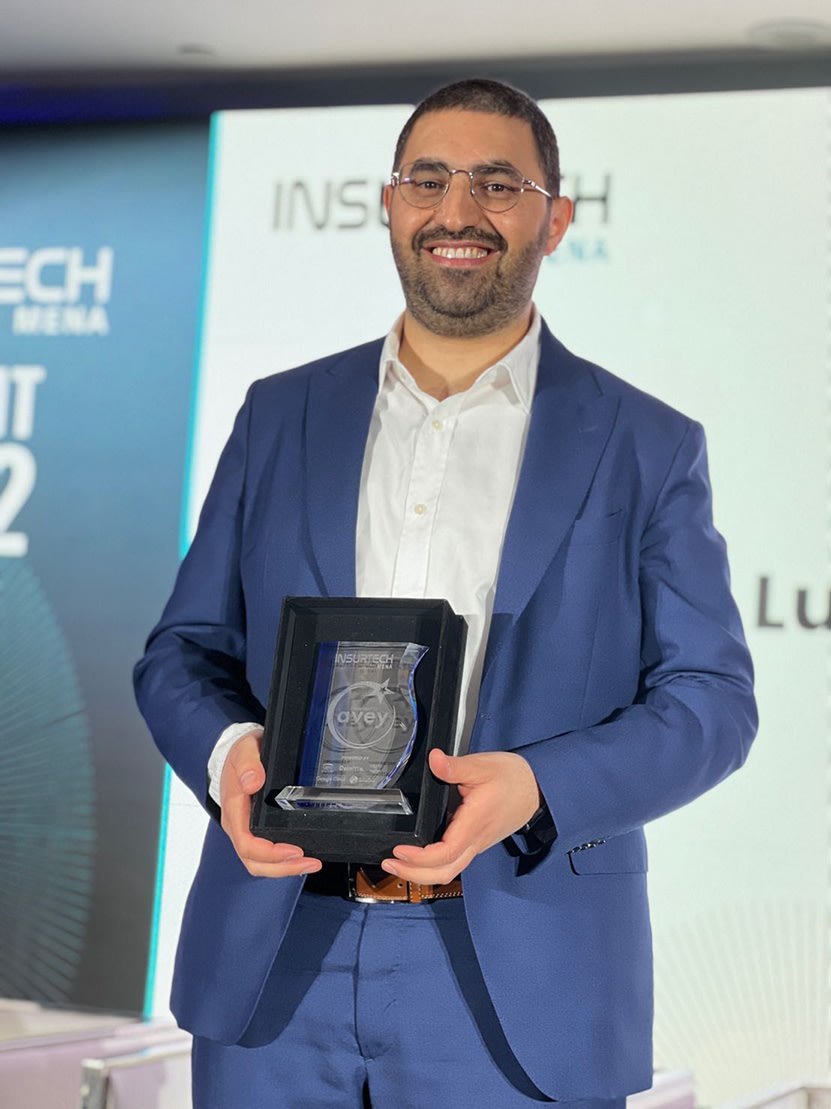
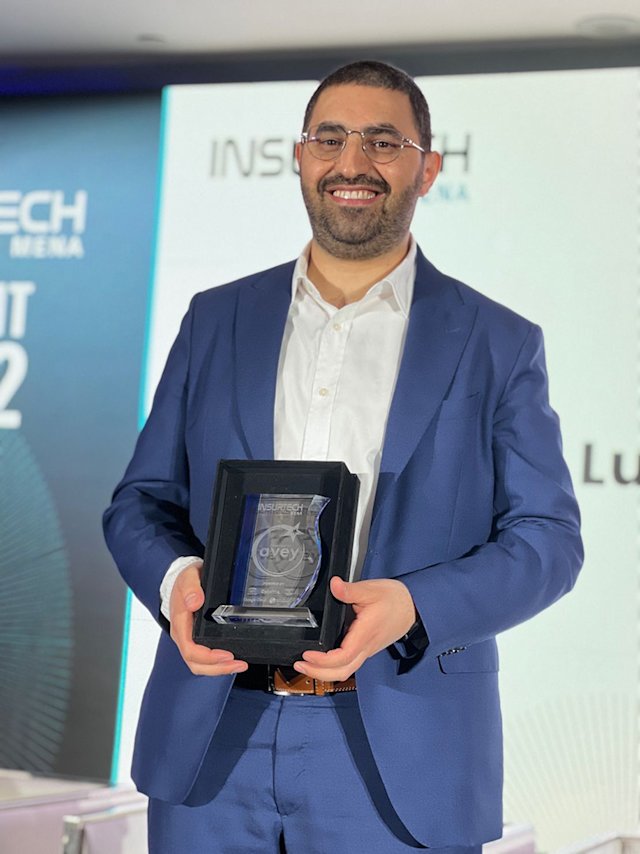
Rimads’ Avey is a fantastic example of homegrown innovation that contributes toward the rapid growth and development of our economy while addressing a global need.
Rimads was among 137 startups from around the world to compete in InsurHack MENA 2022
Education and Insight
Even during the summer break, education never stops at QF – as two of its partner universities proved in July.
Over a two-week period, Grade 11 and 12 school students from Qatar had the opportunity to experience life at university through a Georgetown University in Qatar program that offered classes in topics including international relations and global politics, while also giving them an insight into completing university applications and what college coursework involves.
And three alumni of Weill Cornell Medicine-Qatar (WCM-Q) who are now working as physicians in Qatar and the US returned to their old academic home to help the university’s current medical students plan their career paths.
The biannual WCM-Q Career Advising Seminar saw the doctors share their own academic and professional journeys to 50 students, with Dr. Thurayya Arayssi, the university’s Vice Dean for Academic and Curricular Affairs, saying: “It is a great way for our current medical students to benefit from the advice of some of our graduates who have built successful, rewarding, and fulfilling careers.”
Even during the summer break, education never stops at QF – as two of its partner universities proved in July.
Over a two-week period, Grade 11 and 12 school students from Qatar had the opportunity to experience life at university through a Georgetown University in Qatar program that offered classes in topics including international relations and global politics, while also giving them an insight into completing university applications and what college coursework involves.
And three alumni of Weill Cornell Medicine-Qatar (WCM-Q) who are now working as physicians in Qatar and the US returned to their old academic home to help the university’s current medical students plan their career paths.
The biannual WCM-Q Career Advising Seminar saw the doctors share their own academic and professional journeys to 50 students, with Dr. Thurayya Arayssi, the university’s Vice Dean for Academic and Curricular Affairs, saying: “It is a great way for our current medical students to benefit from the advice of some of our graduates who have built successful, rewarding, and fulfilling careers.”
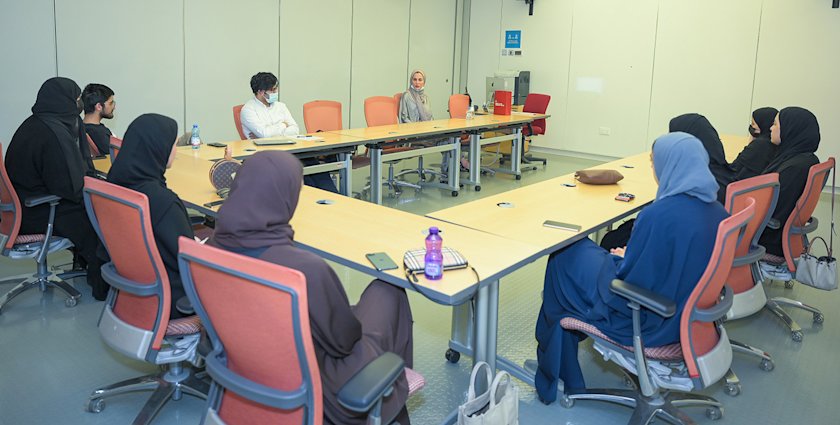
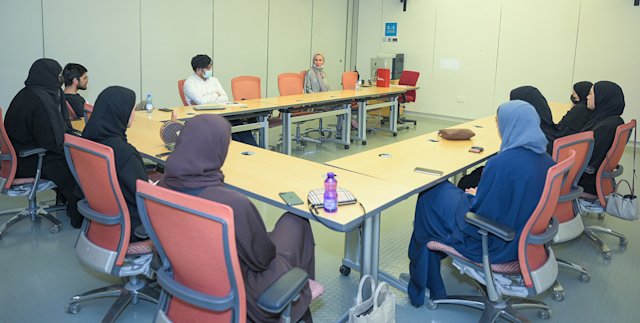
Whether participants decide to apply to Georgetown University in Qatar or another school, we want to make sure they have the best chance of success.
30 school students of 9 nationalities participated in the Georgetown Pre-College Summer Program